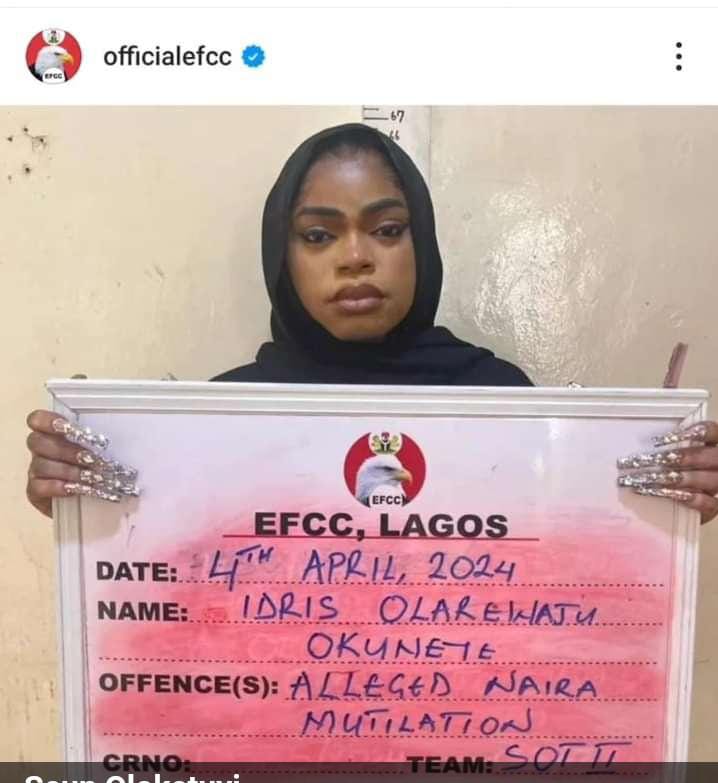Idris Okuneye, the provocative Nigerian crossdresser and social media influencer widely known as Bobrisky, has found himself at the center of a growing scandal as new criminal allegations emerge following his recent imprisonment. The once-celebrated figure, who has garnered significant attention for his flamboyant lifestyle and unapologetic persona, may now face serious legal repercussions for purportedly evading proper custody procedures during his six-month jail term.
Bobrisky was sentenced to six months in prison on April 12, 2024, for violating Nigeria’s currency regulations, specifically for abusing the naira. This incident underscored the heightened scrutiny of financial behaviors in a country grappling with economic challenges. Following his release on August 5, whispers of impropriety began to circulate, setting the stage for a more complex narrative.
The situation escalated dramatically when Martins Otse, a controversial social commentator known as VeryDarkMan, released a voice note allegedly featuring a conversation with Bobrisky. In this recording, Bobrisky purportedly boasted about bribing officials from the Economic and Financial Crimes Commission (EFCC) with a staggering N15 million to dismiss serious money laundering charges against him. Moreover, he claimed to have influenced correctional service officials to allow him to serve his sentence in the comfort of a private apartment rather than within the confines of the correctional facility. “I paid them to stay in my house while I was supposed to be in prison,” Bobrisky allegedly said in the voice note.
In response to the incendiary claims, Minister of Interior Olubunmi Tunji-Ojo convened an investigative panel on September 30, 2024, aimed at examining the veracity of these allegations. Chaired by Permanent Secretary Magdalena Ajani, the panel’s mandate included assessing both the claims of Bobrisky’s misconduct and the potential involvement of corrupt officials within the Nigerian Correctional Service (NCoS) and the EFCC.
The panel concluded that there was no concrete evidence to support claims that Bobrisky had spent his jail time outside the Kirikiri Custodial Centre. However, it did find that Bobrisky’s assertions had severely damaged the credibility of the correctional service. The report stated, “Bobrisky has tarnished the image of the correctional service with false claims,” and recommended that the Department of State Services (DSS) investigate whether Bobrisky, directly or indirectly, had bribed public officials. If substantiated, these actions could lead to charges under the Corrupt Practices and Other Related Offences Act.

The findings prompted the panel to recommend that the NCoS pursue defamation suits against Bobrisky under sections 373-375 of the Criminal Code Act. This legal recourse aims to hold Bobrisky accountable for allegedly misrepresenting his prison experience, thereby tarnishing the institution’s reputation.
The report also highlighted misconduct among several correctional officers, recommending disciplinary action against four individuals. Notably, Ben Rabbi-Freeman, a former Controller of Corrections, was accused of improperly facilitating Bobrisky’s transfer between custodial centers without appropriate documentation. Deputy Controller Micheal Anugwa was similarly indicted for admitting Bobrisky into the Medium Security Custodial Centre without the requisite transfer paperwork. The report asserted that such actions “demonstrate a clear violation of procedure and accountability standards.”
The panel’s investigation revealed a pattern of procedural lapses, including backdated documentation that called into question the integrity of the custodial system. The recommendations for disciplinary measures serve as a call to restore accountability within the NCoS.
In addition to addressing Bobrisky’s specific case, the panel’s report called for sweeping reforms within the Nigerian correctional system. An audit of all inmates and detainees is recommended, focusing on their legal warrants and records to ensure transparency and proper management. The panel emphasized the need for a sustainable oversight mechanism to prevent future abuses and enhance operational integrity.
Moreover, the report advocates for the decommercialization of welfare services for inmates, suggesting that adequate funding and partnerships with civil society organizations are crucial for improving conditions within correctional facilities. The panel also urged for the implementation of non-custodial measures to reduce the reliance on imprisonment, recommending that incarceration be used only as a last resort.
As the investigation continues and public interest mounts, Bobrisky’s future remains uncertain. Once a figure of fascination in Nigeria’s cultural landscape, he now stands at a crossroads, facing potential criminal charges that could further complicate his already controversial public persona. This unfolding saga not only highlights issues of celebrity culture and accountability in Nigeria but also reflects broader societal challenges, including corruption within public institutions and the need for systemic reform.
The outcome of these allegations against Bobrisky and the resulting legal actions could serve as a critical moment for the Nigerian legal system and its efforts to address corruption and ensure justice. As this story develops, it raises significant questions about the interplay between fame, power, and accountability in a rapidly changing society.